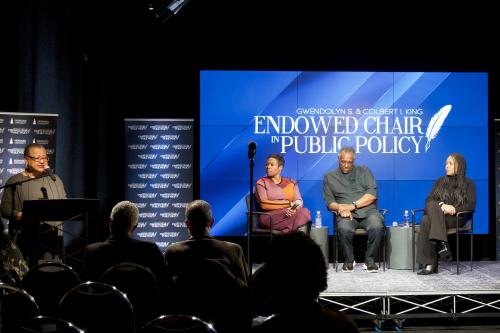WASHINGTON - A new clinical trial run by Howard University, University of Illinois Chicago and University of Miami will partner with community organizations and sites to bring life-saving care closer to a highly vulnerable population: Black people with opioid use disorder.
The trial is funded by the National Institute on Drug Abuse (NIDA) is part of the Helping to End Addiction Long-term (HEAL) Initiative at the National Institutes of Health. The total grant is for five years and $14.2 million dollars, which will be shared by the three institutions.
The clinical trial builds on the Better Together pilot program developed by Howard University’s Department of Psychiatry and Behavioral Sciences, in partnership with its community advisory board. The Better Together trial will utilize non-medical neighborhood sites such as churches, community centers and homeless shelters to establish and maintain patients on buprenorphine, an effective medical treatment for opioid dependence. The study will test the community-focused approach at sites in Chicago, Miami, and Washington D.C.
The trial will be co-led by Richard Schottenfeld, MD, professor and chair of the Department of Psychiatry and Behavioral Sciences at Howard University, Niranjan Karnik, visiting professor of psychiatry at the University of Illinois Chicago, and José Szapocznik, PhD, professor and chair emiritus, Public Health Sciences and director of the Center for Family Studies, University of Miami. Schottenfeld said the ideas used in the clinical trial resulted from focus group research and a multi-year partnership between researchers and community advisers in his department at Howard University.
“We tried to understand why Black people with opioid use disorder aren’t coming in for treatment,” Schottenfeld said. “We found that enormous amounts of stigma, misunderstandings about addiction and bias against certain types of treatment are barriers to bringing people in and keeping them in treatment.”
Within the broader opioid crisis, Black people suffer drug overdose deaths at a higher rate than other racial groups, and lag behind in the use of proven addiction treatments. Experts cite health care access, the stigma against people who use opioids, and mistrust of the medical system as significant barriers to reaching these at-risk patients and enrolling them in care.
Supported by the National Drug Abuse Treatment Clinical Trials Network, the study will use a community-engaged, hub-and-spoke model of providing treatment to persons with opioid use disorder, with participants receiving counseling and peer support at local neighborhood locations supported by remote prescription and management of buprenorphine from University physicians via telehealth.
By developing relationships with credible messengers and centering treatment in trusted community organizations while working together with credible messengers in the community, the Better Together program builds on existing community strengths and resources. So far, the pilot program has succeeded in attracting and engaging people who need treatment closer to home provided by people they trust.
By moving care from medical centers to community locations, the researchers expect multiple benefits for patients receiving treatment for their opioid use disorder. For many people, it will reduce the distance they need to travel for regular visits. Alongside intermittent remote check-ins with physicians, support will also be provided in comfortable, familiar environments by peers from the patient’s own community.
Patients in the study will follow a treatment program, known as the Better Together recovery guide, with a peer recovery support specialist and community retention and engagement specialists, often people who have gone through recovery themselves.
Participants in the Better Together trial will be compared against a control group receiving buprenorphine and related support in a traditional medical clinic environment. Researchers will examine not only the medical outcomes of the treatment, but also factors such as retention and patient satisfaction that would help effectively serve opioid users over the long term
The Better Together trial will concentrate its initial activities in Washington, Chicago, and Miami – three cities hardest hit by the ongoing opioid crisis. In the first phase of the study, research teams will form community advisory boards in their respective locations and select key partner organizations and potential treatment sites embedded within the priority neighborhoods.
More information about the study will be available at the NIDA Clinical Trials Network website under CTN-0144.
###
About Howard University
Founded in 1867, Howard University is a private, research university that is comprised of 14 schools and colleges. Students pursue more than 140 programs of study leading to undergraduate, graduate and professional degrees. The University operates with a commitment to Excellence in Truth and Service and has produced two Schwarzman Scholars, four Marshall Scholars, four Rhodes Scholars, 12 Truman Scholars, 25 Pickering Fellows and more than 165 Fulbright recipients. Howard also produces more on-campus African American PhD. recipients than any other university in the United States. For more information on Howard University, visit www.howard.edu.
Media contact: Sholnn Freeman; sholnn.freeman@howard.edu





